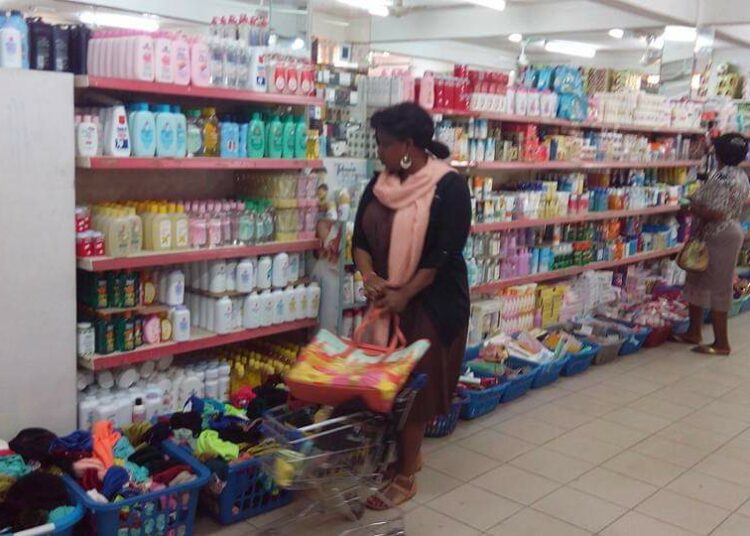Amid rising cost of food and other essential items, super markets are witnessing poor sales. A survey around departmental stores along the Lagos-Ibadan Expressway showed low patronage. An anonymous staff member of one of the stores said, “it has been a herculean task for the stores as we have to set and re-tag some of the items on our shelves.”
Prices of goods and commodities have been on the rise almost on a daily basis in recent times and this may have partly affected the patronage for the departmental stores.
A staff of Kortsy Supermarket who simply identified herself as Adenike said, “Initially, the increase wasn’t as high as this. Presently, you cannot compare the rate to that of three months ago with the prices of commodities on the rise, while shoppers are lamenting and reducing their list of items.
“It is easy to know that the economic power of Nigerians is reducing as it reflects on the patronage we are seeing today.
“The constant change of prices is massively leading to reduction in the economic powers of Nigerians. People are reducing their list of items and based on the adjusted prices which has become a constant thing, people are not trooping in to shop for the weekends like before.”
While Fridays and Saturdays’ patronage in various stores are high, careful observation and interaction with staff of some of the departmental stores showed that there is low patronage in the last few days.
On the regulation of the prices, those who spoke said, they have to set the prices themselves based on what they got in the marketplace, as they echoed that there is no regulatory body that fixes how much the goods should be sold, even as this is a sales and management decision on the price review being the decision of business owners.
Beatrice, a staff of Kortsy Supermarkets, said, though she is at the counter, in the last three months, the constant change in the prices of goods in the supermarket has made customers lament about the cost of items on their shelves.
“As an individual, I can’t even afford to buy some of these items as the prices keep increasing astronomically. I have to check and re-check some items to ascertain if I’m logging-in the right prices for them just as customers keep reducing the items most times when they see new rates of commodities,” she said.
She stressed that the prices, to the best of her knowledge, are not regulated by any authority except the business owners since they would consider the increase on each product and set a price for it.
“The prices are adjusted based on the cost of the goods supplied or bought in the markets while presently, the buying power of shoppers are gradually decreasing from the sales record,” she stressed.
A shopper who refused to be identified lamented that a pack of noodles which was N7,500 a couple of days ago is now being sold for N10,000 in some stores which he said is absurd as he advocated for a consumer protection body that could do something about some of the seemingly outrageous prices of items.
The Iyaloja, FAAN Market, Ikeja, Afusat Shehu, said: “the country is hard; everybody knows that. We only pray God should make it easier for us all. Prices of food stuff keeps going up on a daily basis. A 50kg bag of rice is now sold for N75,000. Three months ago, it was not so. It was N58,000. Tomatoes are also expensive now. A basket of tomatoes is N40,000 as against three months ago when it was less than N10,000. Pepper moved from N25,000 to N85, 000, while onions took a positive turn from N45,000 to N28,000. And these changes in prices keep occurring every day. If you buy goods today at a certain price, the next minute or day you go back to the market, the price has increased.
“The market people are the ones who determine the prices of the goods. The only reason they give is the high exchange rate of dollars to naira. If get to the market, they will tell you it is the dollar that is affecting the increase in the prices of commodities. God will help us and also help us to get the message across to the government to help and find solutions to the rising cost of goods.”
Also at FAAN Market, Ikeja, a suya (meat) seller, Surajo Bala, said he is just pushing the business little by little just to survive. “The worth of meat I bought at N24,000 three months ago is now being sold between N35,000 and N38,000. When asked how he knew the size since there was no form of physical measurements or scale, he said, “How won’t I know? Is it not my work? I have been doing this for years.”
According to him, the major reason there is a surge in the price of meat is the high cost of Premium Motor Spirit (petrol). ” Na fuel make meat cost. Shey cow dey Lagos? No bi to carry am from village come here for Lagos? Before, cow or goat no cost but since fuel price don go up, transport don go up and na im make meat price go up too,” he said in pidgin.
Abuja Residents Lament Habitual Increase In Prices of Commodities
It is no longer news that Nigerians are grappling with the present economic hardship which has resulted in daily increase in commodities generally, ranging from foodstuff, electronics, building materials to other basic requirements for daily living.
In the Federal Capital Territory (FCT), residents are lamenting how they can survive the continuous increase in prices of daily requirements, which they said that if not checked will continue to affect the lives of Nigerians negatively.
One of the sales points where prices of commodities are being increased on a daily basis are departmental stores, which has become a major concern to residents.
A resident of Garki II, Mrs Veronica Yohanna, while expressing concern about the daily increase of commodities in ShopRite in the territory, said that the development is frustrating customers from patronising the stores.
“I do not know where we are going in this country. Imagine that I went to a shop in this ShopRite and was told that what I bought yesterday at the price of N12,500, is now N18,000. The increase is frustrating and it is enough to cause depression in the midst of biting economic challenges.
“Sometimes you will enter some shops in this ShopRite, and want to buy a particular stuff, the salesperson will tell you that the manager gave an instruction that it should not be sold because they are waiting to know the current price of the product.
“It is not right at all. I do not know where this country is going at all. The government has to do something about this economic problem we are facing, if not, many people will die before their time,” she said.
An operator in a popular departmental store at Adetokunbo Ademola Crescent, Wuse 2, Mr John Chukwuebuka, said that they change their prices based on the dollar rate in the market, because the inflation is affecting importation of goods, stressing that in the last two months, prices of goods have increased more than three times.
“We do not increase the prices of these things for the fun of it. It is the rate at which the naira has fallen in the market. You know the price of dollars controls the prices of goods and services in Nigeria. Whenever the dollar increases, the prices of goods and services increase. It is really a big problem for us and we are not enjoying it at all,” he said.
In a departmental store at ShopRite at Zone 5, Abuja, one of the operators who preferred anonymity, said that they have increased the prices of their products more than three times in two months, and that such development has affected sales negatively.
“We increase the prices of things in this shop according to the instructions from the manager. The manager can just come today and say, remove that price tag, and replace it with this one, that it is the current rate in the market.
“Most of the increase in prices is based on instructions from the owner of the shop. Sometimes, it is frustrating because our desire is to satisfy our customers, but when we see them complaining, we are not happy,” he said.
LEADERSHIP Sunday visited an electronic shop in the Sahad Store area at the Central Business District where the operator of the shop, Mr Okafor, advised that if anybody enters a shop and wants to buy electronics, if told a price, he should buy it immediately because the price might change in less than 24 hours.
“The way things are going in Nigeria, nothing is sure again, because nobody knows where we are going. You will price something today at the rate of N150,000, when you come tomorrow, it will be N250,000,” he lamented.
The constant change in the prices of commodities made the Federal Competition and Consumer Protection Commission (FCCPC) to seal and later re-opened Sahad Stores, a popular Abuja shopping mall in the territory on Friday for alleged disparity between prices on the shelves and what customers had to pay.
The enforcement team, which was led by the acting executive vice chairman of FCCPC, Adamu Abdullahi, visited the store unannounced and decided to seal the store to serve as a deterrent to other departmental store owners.
Abdullahi explained that the commission’s preliminary investigation confirmed that the management of the supermarket was short-changing customers, and that the store would remain sealed until the completion of the further investigation.
“What we have found out that these people are doing is misleading pricing and lack of transparency in the pricing, which is against Section 115 (3) of the law that says a consumer is not required to pay a price for any good or service higher than the one that’s on display,” he said.
When LEADERSHIP Sunday visited the store’s branches in the Central Business District and Area 11 Garki, only a section of the latter was sealed, while the other section of the branch, in a separate building, was not sealed.
One of the branch supervisors who preferred anonymity explained that the reason stated by the FCCPC, was because the section heads failed to update prices on the counter.
Departmental Stores Losing Patronage Due To Constant Changes In Prices Of Goods
Majority of the departmental stores in Port Harcourt, the Rivers State capital, have claimed that they are losing patronage due to the constant change in prices of commodities.
Some of the major departmental stores in the state capital are the Port Harcourt Mall, Hypercity, Everyday Emporium, Garden City Mall and Market Square.
Speaking with LEADERSHIP Sunday, a manager with one of the stores who pleaded for anonymity, said the current constant changes in prices have made a lot of their customers stop coming to patronise them.
“The constant changes in the price of commodities have made us and several other malls in Port Harcourt look like people who are not serious.
“Most of our customers have stopped coming. It is only the big boys who can buy anything no matter the price that are still coming,” he stated.
LEADERSHIP Sunday learnt from the departmental stores visited that prices of commodities have changed only two times in the past three months.
It was also learnt that the prices are not fixed by any state authority but based on the amount the commodities were bought from the manufacturers and suppliers











